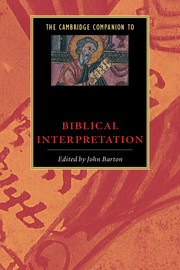Book contents
- Frontmatter
- Introduction
- Part 1 Lines of approach
- 1 Historical-critical approaches
- 2 Literary readings of the Bible
- 3 The social world of the Bible
- 4 Poststructuralist approaches New Historicism and postmodernism
- 5 Political readings of Scripture
- 6 Feminist interpretation
- 7 Biblical studies and theoretical hermeneutics
- 8 The Bible and Christian theology
- 9 Biblical study and linguistics
- 10 Aspects of the Jewish contribution to biblical interpretation
- 11 The Bible in literature and art
- Part 2 Biblical books in modern interpretation
- General Index
- Index of Biblical References
5 - Political readings of Scripture
from Part 1 - Lines of approach
Published online by Cambridge University Press: 28 May 2006
- Frontmatter
- Introduction
- Part 1 Lines of approach
- 1 Historical-critical approaches
- 2 Literary readings of the Bible
- 3 The social world of the Bible
- 4 Poststructuralist approaches New Historicism and postmodernism
- 5 Political readings of Scripture
- 6 Feminist interpretation
- 7 Biblical studies and theoretical hermeneutics
- 8 The Bible and Christian theology
- 9 Biblical study and linguistics
- 10 Aspects of the Jewish contribution to biblical interpretation
- 11 The Bible in literature and art
- Part 2 Biblical books in modern interpretation
- General Index
- Index of Biblical References
Summary
It is often suggested that 'political readings' of Scripture are a recent invention, more especially of Marxist or leftist thought. That Scripture did not bear on human life together, on the 'polis', would however have sounded very strange to most Christians before the end of the eighteenth century, as a moment's reflection on the political involvement of the Byzantine and medieval Church will show. Martin Luther's two-kingdom doctrine, which taught that the Church and the state occupied two quite different spheres of responsibility, and which was very much a response to his own political situation, paved the way for the privatization of religion, especially in pietism. Luther himself, however, did not hesitate to draw the most brutal political consequences from Scripture. Where sixteenth- and seventeenth-century Protestantism read the whole Bible as the word of God, pietism focused on the New Testament, and the soul's relation to Jesus. The political context of the Old Testament was thereby lost to view. By 1790, in his Reflections on the Revolution in France, Edmund Burke is telling us that politics and the pulpit 'have little agreement', a foretaste of countless angry protests when church leaders have criticized political policies.
- Type
- Chapter
- Information
- The Cambridge Companion to Biblical Interpretation , pp. 67 - 80Publisher: Cambridge University PressPrint publication year: 1998



